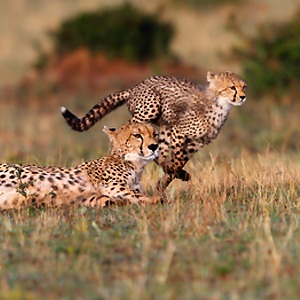
Cheetahs can aptly be called the race cars of the animal kingdom: sleek, graceful and supremely speedy.
Scientists have now taken a bit of a look under the hood of these feline Ferraris to gauge how much energy they burn as they traverse their African habitats and to gain insight into factors that may be contributing to their precipitous population plunge.
A study published on Thursday in the journal Science described how researchers tracked 19 free-roaming cheetahs for two weeks at two sites in South Africa and Botswana.
Read: A cheetah with stripes?
They measured energy expenditure after injecting cheetahs with isotope-laden water and later analyzing their feces.
They were surprised to learn that cheetahs used relatively little energy in their high-speed chases for prey like gazelles and impalas.
The world's fastest land mammals, known for their spotted coat, cheetahs accelerate from a standstill to 60 mph (96 kph) in three seconds in amazing short bursts of speed.
"Our data suggest that they are indeed perfectly adapted to this hunting technique. They recover pretty fast, so the high-speed hunting doesn't really affect their quality of life," said one of the researchers, North Carolina State University biologist Johnny Wilson.
The findings also contradicted the hypothesis that cheetahs expend an inordinate amount of energy catching new prey after bigger competing predators like lions and hyenas steal carcasses brought down by them.
Their biggest energy drain was the distances cheetahs must walk while seeking prey thanks to man-made problems like habitat loss in grasslands and other areas, fences restricting free travel and people killing too many of the animals cheetahs eat.
Watch: South Africa's Bryan Habana, the world's fastest rugby player, race a cheetah
Queen's University Belfast biologist Michael Scantlebury, who led the study, said the cheetahs traveled up to nearly 19 miles (30 km) per day. He said "cheetahs may be Ferraris but most of the time they are driving slowly," traipsing over sand dunes in baking heat with no water to drink.
Cheetah populations have declined from about 100,000 to 10,000 over the past century, experts say.
"It is us humans that are going to be responsible for their dwindling numbers. We need to be even more careful to look after and maintain the remaining areas of the world that are truly wild, and we need to think about the consequences of our actions," Scantlebury said.
Another study in the same journal used a different approach to assess energy expenditure in another big cat, the mountain lion of the Americas, also known as a puma or cougar.
Scientists studied energy expenditure by mountain lions by somehow putting some on treadmills. They then used a special tracking collar to monitor their movements in the wild. Mountain lions do not use speed, but use an energy-conserving sneak attack with a lethal pounce.
"The more time that the animals could spend in low-activity level behaviors - stalking, sit-and-waiting, slow walking - the greater the relative benefit of the kill, basically less calories expended for obtaining prey calories," said University of California-Santa Cruz wildlife physiologist Terrie Williams.
Read more:
How the cheetah got its stripes
A robot that runs like a cat
Image: cheetahs, from Shutterstock




 Publications
Publications
 Partners
Partners










